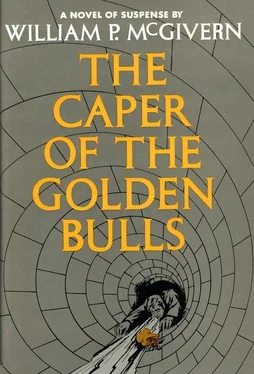“Tourists. I live in a village of strangers. Sometimes through the glitter of sports shirts and cameras I see a familiar face. An old man I went to school with. A widow with white hair whom I chased squealing through the olive trees in my youth. They are like ghosts.” He sighed again. “Everything is changing. They are sending our Virgin to Pamplona for the fiesta of San Fermin. Did you know that?”
“No.”
“She has never left the village before. But everything is changing today. The fact that a thing exists condemns it. It must be changed. Regardless of the expense.”
“How’s that?”
“It’s just been announced. All the Virgins from Seville, Malaga, Granada, Cordova, from all the cities are being sent to Pamplona.” He sighed deeply. “One will be named Queen of San Fermin.”
“Like a beauty contest?”
“I think a more tasteful name might be found for it.”
“I’m sorry,” Peter said.
“Of course. But the expense. To crate the Virgin, to insure her jewels, poor as they are, to transport her to Pamplona, to make certain she is securely guarded. It’s an enormous expense.”
“I don’t have a cheque-book here at the pool, Antonio.”
Antonio looked at him in surprise. “Why did. you want a cheque book?”
“Well, I’m practically a native son. I’d like to help out. Make a contribution to the Virgin’s trip.”
“It’s not necessary.”
“I’d like to, Antonio.”
“Then I imagine it can be arranged. I’ll stop by later at the bar.” He looked through his pockets. “I can’t find your summons, Peter. I may have lost it. If I find it, I’ll put it in the mail.”
He went away and the maids called Peter to his breakfast.
In shorts and sandals he drank American coffee and ate Danish bacon, items sent to him regularly by Mr. Shahari, the Indian money changer in Gibraltar. The maids chattered around him in high, cheerful voices; of the evils of the egg woman; the perfidies of the bread man, the wood man, the gypsy beggars. They were the epic poets of the village, writing on air the high drama of the drunken fisherman, the burned child, the fifty-peseta note blown from the window sill and lost forever in the sands.
Grace came on to the terrace through the living-room doors. In a white dress and golden sandals she drew all the colour from the flowers, all the light from the sky; to Peter she seemed the glittering centre of the universe.
“Darling, I’ve brought you a little surprise. Debby, say hello to Mr. Churchman.”
The child at her side said, “Hello, Mr. Churchman.”
“Now what a pleasant surprise!” Peter said rather too heartily. “How old are you, Debby?”
“I’m eight.”
“Still in grade school I expect.”
“Yes.”
“Would you like some cookies? A glass of milk?”
“She’s had a huge breakfast, Peter. Debby, be a good child. Go off and find something to play with. I’m sure there are cats.”
The child went away and Grace sat down opposite Peter. She looked at him with splendid loving eyes and said, “I don’t think it’s violas or contra-bassoons. Cellos maybe?”
“Grace! You’ve been in my journal.”
“It was on the table in the hall. Like a guest book. I looked at a page, which began, ‘She is tall as a silver beech tree’ so I knew it was about me. It was lovely, Peter. Bonfires of excitement. Bugles and trumpets. But it made me very sad.”
“Why?”
“I have another surprise for you, I’m afraid. I’m pregnant.”
The child came on to the terrace and said: “Mommy, I found a cat.”
“How nice, dear.”
“It made a mess on the floor.”
“Well, tell the maid, dear.”
“How? I can’t speak Spanish.”
“Tell her elgatto aquaed on the floor.”
“I don’t think he aquaed.”
“Dear. Well, just tell the maid. She’ll cope.”
The child went back into the living-room. Peter took Grace’s hand in his, and smiled at her indulgently.
“You can’t be pregnant, darling. I’m sure of it. Trust me.”
She withdrew her hands. “It’s not you, for heaven’s sake. It’s my husband. Guy.”
“How fortunate he wants you back.”
“Oh, how cruel you are. I see what satisfaction this gives you!”
“Now, Grace! Don’t try to put me on the defensive.”
“How could I do that? Unless it’s where you belong!”
From the living-room they heard shrill and righteous exclamations from a maid; the defiant snarl of the cat; the swipe of a broom; the slam of a door; the sloshing of water on the floor.
“It was last month, when I went up to Paris. I hardly knew you then, Peter.”
“I see.”
“In France, we are still technically man and wife. It’s some legal, religious arrangement with Mexico.”
“How interesting.”
She sighed. “I was prepared for anything. Anything but provincial sniffs. Well. I see you’ve made up your mind about me.”
They went into the long, sombrely furnished living-room, dark and cool after the sunny terrace.
“Come on, Debby. We’ve got to be going.”
The child lay on her stomach looking at an American magazine. She was really quite small, Peter thought; slim white arms and legs, neck no thicker than a banana.
“How much does she weigh?”
“What an odd question! Were you thinking of roasting her or something?”
“Well, no. Is she the oldest?”
“Yes. Why?”
Face the violet fields of peace gratefully, Peter told himself; remember you came through the battle intact.
“Well, if you packed them all together figuratively speaking, I mean they’d hardly displace one normal-size adult.”
“Pack them? In what? A trunk?”
“Don’t be idiotic. I know they’re distinct individuals. With private paths to travel, with immortal souls to save, with dreams as distinct as their fingerprints.” He wondered fleetingly if he believed this, decided it didn’t matter, pressed on. “I’m not a brute. But, Grace, in a physical sense, in a manageable sense, they’re more like one person than three. Bulkwise that is.”
“You’re just playing around with words. To make it all right.”
“Well, of course.”
She looked at him tremulously, meltingly, and touched his cheek with the back of her fingers. “Do you wonder that I love you?”
“Mushy stuff,” the child said frowning.
Peter thought of boarding schools in northern climes. Train stations shuttered up, airfields socked in, Christmas carols sounding in draughty dormitories. Great educational freezers full of trapped children. Cheery wires to snow-bound kiddies: Chins up, see you in the spring.
Grace said, “Peter, what are you grinning at?”
“Just at how wonderful it’s going to be.”
“Mushy stuff.”
“True, true,” he said, smiling at the child.
At Peter’s bar in the central plaza of the village, an American girl named Cathy Clark pleaded with Mario for a drink. She was nineteen, intense and nervous, with a slim figure, curly brown hair, neat wrists and ankles, and a surprisingly pleasant voice. When Peter arrived she sighed with relief and took her appeal to this higher court.
“Peter, please explain to Mario I’m not drunk. I’m heartbroken, demoralised, shattered, but I’m not drunk.”
“Maybe a nap is what you need.”
“I’m not sleepy. I couldn’t sleep. And I don’t really want a drink. I just want to talk to someone.”
“Okay, come in my office.”
Peter glanced at his mail while Cathy told him about someone named Morgan. From his desk he had a view of the barroom and the terrace facing the plaza. The tables were filling up with bearded young Americans, families of French people, Britishers taking a whisky or sherry before setting out to tramp about the mountains.
Читать дальше












